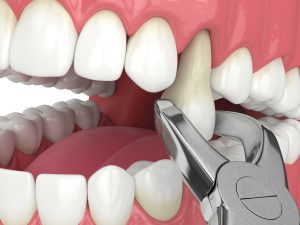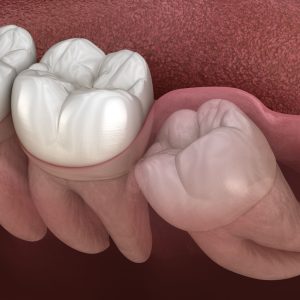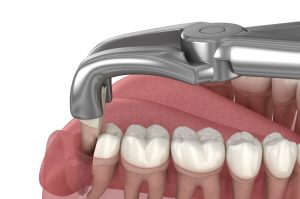Relief from Tooth Pain: Your Guide to Tooth Extractions and Wisdom Teeth Removal
Are you tired of persistent tooth pain, discomfort, or crowding issues? If so, it might be time to consider tooth extraction or wisdom tooth removal. At Polasek Digital Dentistry & Schaefer Dental Group, our skilled Howell, MI dentist, Dr. Kyle Polasek, and his compassionate team are dedicated to providing tailored care to alleviate your tooth-related concerns.
Whether through a simple extraction or the removal of problematic wisdom teeth, they’ll guide you toward a healthier, more comfortable smile. Don’t let lingering tooth pain diminish your quality of life – call the professionals at Polasek Digital Dentistry & Schaefer Dental Group by dialing 517-546-8983.
What Is Tooth Extraction & Wisdom Teeth Removal?
Tooth extraction is a dental procedure that involves the removal of a tooth from its socket in the jawbone. This can be necessary for a variety of reasons, such as severe tooth decay, gum disease, or crowding issues. There are two main types of tooth extractions: surgical and non-surgical.
Non-surgical extractions are typically performed on teeth that are visible above the gumline and can be easily removed with forceps. Surgical extractions, on the other hand, are required when the tooth is impacted (stuck beneath the gum line) or has broken off at the gum line. These procedures involve making an incision below the gum and potentially removing bone tissue to access and remove the tooth. Surgical extraction is often necessary for impacted wisdom teeth extraction.
What Are Wisdom Teeth?
Wisdom teeth, also known as third molars, are the last set of permanent teeth to emerge, typically between the ages of 17 and 25. While some people have no issues with their wisdom teeth, for many others, these teeth can become impacted, causing pain, swelling, and even infection. In such cases, wisdom tooth removal is often recommended to prevent further complications. Wisdom teeth removal is a specific type of extraction that focuses on the third and final set of molars, which are commonly impacted.
Benefits of Tooth Extractions and Wisdom Teeth Removal
Undergoing tooth removal when necessary can have substantial benefits, some of which include:
- Relieves Pain and Discomfort: Extracting a damaged or impacted tooth can alleviate persistent pain, swelling, and other uncomfortable symptoms.
- Prevents Infection: By removing a decayed or impacted tooth, you eliminate the risk of infection spreading to surrounding teeth, gums, or jawbone.
- Improves Oral Health: Extracting problematic teeth can create more space in your mouth, making it easier to maintain proper oral hygiene and prevent future issues.
- Eliminates Crowding: Removing wisdom teeth or other teeth that are causing crowding can improve the alignment of your remaining teeth, potentially reducing the need for orthodontic treatment.
- Prepares for Dental Treatments: In some cases, tooth extraction is necessary to create space for dental implants, dentures, or other restorative treatments.
- Promotes Proper Bite: Extracting teeth that are severely misaligned or crowded can help restore a proper bite, reducing strain on the jaw and preventing further dental issues.
- Reduces Risk of Cysts or Tumors: Impacted wisdom teeth or other problematic teeth can sometimes lead to the development of cysts or tumors in the jawbone. Extraction eliminates this risk.
- Alleviates Sinus Issues: Impacted upper wisdom teeth can sometimes put pressure on the sinus cavities, leading to pain, congestion, and other sinus problems. Extraction can provide relief.
Who Qualifies for Tooth Extractions and Wisdom Teeth Removal?
You may qualify for wisdom teeth removal if any of the following apply to you:
- Severely decayed or damaged teeth that cannot be repaired with other dental treatments
- Impacted wisdom teeth that are causing pain, swelling, or other complications
- Advanced gum disease that has weakened the tooth’s supporting structures
- Individuals undergoing orthodontic treatment who require tooth extraction to create space for proper tooth alignment
- Preparing for dentures or dental implants, which may require the removal of remaining teeth
The Tooth Extractions and Wisdom Teeth Removal Process
Consultation
The process begins with a thorough consultation with your Howell extraction dentist, Dr. Polasek. During your consultation, Dr. Polasek will evaluate your oral health, take X-rays, and discuss your medical history. He’ll also determine if tooth extraction or wisdom tooth extraction is the best course of action and explain the procedure in detail.
Preparation
Depending on the complexity of your case, your Howell dentist may prescribe antibiotics or provide instructions for pre-operative care. It’s essential to follow these instructions carefully to ensure a smooth and successful procedure.
Tooth Removal
For non-surgical extractions, your dentist will use specialized dental instruments to gently loosen and remove the tooth from its socket. This process is typically quick and relatively straightforward, and local anesthesia is used to ensure your comfort throughout the procedure.
Surgical extractions are more involved and may require making an incision in the gum to access the tooth. Your Howell dentist will carefully remove any bone or tissue covering the tooth before extracting it. This procedure is typically performed under local anesthesia, and in some cases, sedation dentistry may be recommended for your comfort.
Tooth Extractions and Wisdom Teeth Removal Aftercare
After your tooth extraction or wisdom tooth removal procedure, it’s crucial to follow your Howell dentist’s aftercare instructions to promote proper healing and prevent short or long-term complications. This may include:
- Take prescribed pain medications and antibiotics as directed to manage discomfort and prevent infection.
- Apply an ice pack to the affected area for 20 minutes on, and 20 minutes off, to reduce swelling and discomfort during the first 24 to 48 hours after the procedure.
- Avoid strenuous activity, heavy lifting, or exercise for the first few days to prevent dislodging the blood clot and delaying healing.
- Maintain a soft food diet (soups, yogurt, mashed potatoes, etc.) and avoid hot liquids or foods that could irritate the extraction site until it has healed completely.
- Practice proper oral hygiene by gently brushing and flossing the area, while also rinsing with a warm saltwater solution (1/2 teaspoon of salt in a cup of water) to keep the area clean and promote healing.
- Avoid smoking, drinking through a straw, and vigorous rinsing or spitting for at least 24 hours after the procedure, as these activities can dislodge the blood clot and lead to a dry socket.
- Bite gently on the gauze pad provided to control bleeding and allow a blood clot to form at the extraction site.
- Keep your head elevated, especially when sleeping, to minimize swelling and discomfort.
- Avoid alcoholic beverages, as they can slow the healing process and increase the risk of complications.
- Follow up with Dr. Polasek as scheduled to monitor the healing process and address any concerns or complications that may arise.
Frequently Asked Questions
Most patients experience minimal discomfort during the procedure thanks to local anesthesia and sedation options. Some soreness and swelling are common after the procedure but can be managed with over-the-counter pain medications and cold compresses.
Recovery time varies depending on the complexity of the procedure, but most patients can expect to feel back to normal within a week or two. Following your dentist’s aftercare instructions is crucial for a smooth and speedy recovery.
Most patients only need to take a day or two off after a routine tooth extraction or wisdom teeth removal. However, more complex cases may require additional recovery time, which your own dentist or oral surgeon will discuss with you during your consultation.
While rare, potential risks include infection, excessive bleeding, a dry socket (where the blood clot becomes dislodged), and nerve damage. Following your dentist’s instructions and attending follow-up appointments can help minimize these risks.






